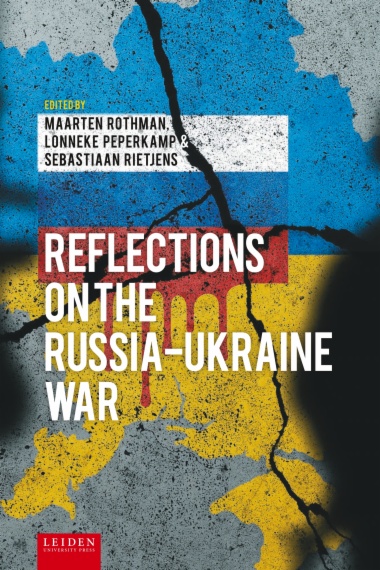"The Russia-Ukraine war is a multifaceted beast. It ranges from fighting on the ground to high diplomacy, from domestic anti-war protests to international weapon supplies, from justification through sham referenda to coercion via economic sabotage, and from operational misdirection to covering up war crimes. There are close connections between these facets: the collapse of a front leads to the discovery of mass graves; the delivery of weapon systems depends on Zelensky’s appeal to the international community; sham referenda followed by annexation enable accusations of unwillingly mobilized soldiers who refuse to defend the motherland. This volume sheds light on the Russia-Ukraine war, exploring this multitude of facets and their interconnections. Bringing together the expertise of our colleagues at the Netherlands Defense Academy (NLDA) allows us to adopt a distinctively interdisciplinary approach, offering uniquely comprehensive and timely reflections on this armed conflict. The 27 chapters in this volume are centered around five themes. The first section covers historical and contemporary narratives, intelligence, digital technologies, and communication strategies. The second provides in depth analyses of the operational aspects of the war, including warfighting on land, at sea, in the air, as well as in the space and cyber domains. The third section on international involvement covers topics such as sanctions, burden sharing, arms support and implications of the war on international institutions and the world order. The fourth provides analyses of the normative framework that applies to the Russia-Ukraine war. Finally, the fifth section deals with the way armed forces can transform their organizations and learn from this war, and concludes with questions on how and when the Russia-Ukraine war might end."
- Table of Contents
- List of Figures, Illustrations and Tables
- Chapter 1. Setting the Scene
- Lonneke Peperkamp, Maarten Rothman, Sebastiaan Rietjens, & Eline Stevens
- Section I. Narratives and Intelligence
- Chapter 2. The War on Ukraine: A Warning from History
- Chapter 3. Caught by Surprise: Warning for Russia’s Invasion of Ukraine
- Michelle Hogendoorn, Bram Spoor, & Sebastiaan Rietjens
- Chapter 4. Open-Source Intelligence in the Russia-Ukraine War
- Hannah van Beek & Sebastiaan Rietjens
- Chapter 5. ‘The Wise Man Will Be Master of the Stars’. The Use of Twitter by a Military Intelligence Service in Wartime: The Case of the GUR
- Chapter 6. Morale and Moral Injury among Russian and Ukrainian Combatants
- Section II. Warfighting
- Chapter 7. Putin’s War, a European Tragedy: Why Russia’s War Failed and What It Means for NATO
- Chapter 8. Putin’s Miscalculation: The Effectiveness of Russia’s New-type Warfare in Ukraine
- Chapter 9. Russian Military Logistics and the Ukraine Conflict: Analyzing Dynamics of Multilevel Alignment
- Thijs Cremers, Sieds Haitsma, Gert Schijvenaars, Armand Soeleman, & Paul van Fenema
- Chapter 10. Explaining Stalemate from a Corbettian Maritime Perspective
- Chapter 11. All Quiet on the Northern Front? Limited War and Covert Action in the Russian-Ukrainian War
- Maarten Rothman & Martijn Rouvroije
- Chapter 12. Assessing the Dogs of Cyberwar: Reflections on the Dynamics of Operations in Cyberspace during the Russia-Ukraine War
- Kraesten Arnold, Peter Pijpers, Paul Ducheine, & Peter Schrijver
- Chapter 13. The Space Domain and the Russia-Ukraine War
- Lonneke Peperkamp & Patrick Bolder
- Section III. International Involvement
- Chapter 14. Does the Russia Sanctions Revolution Bring About Change?
- Esmée de Bruin, Joop Voetelink, & Jeroen Klomp
- Chapter 15. NATO Members’ Burden Sharing Behaviour in the Aftermath of Russia’s Annexation of Crimea, 2014-2021
- Marion Bogers & Robert Beeres
- Chapter 16. Contraband of War at Sea: Interference of Arms Support to the Enemy
- Chapter 17. Between Multilateralism and Great Power Competition�: The Future of European Indivisible and Comprehensive Security
- Sabine Mengelberg & Floribert Baudet
- Chapter 18. The Russia-Ukraine War and the Changing Character of the World Order
- Theo Brinkel & Carel Sellmeijer
- Chapter 19. The West versus the Rest? A Pluralist English School Perspective on the Ukraine War
- Jörg Noll & Sonja de Laat
- Section IV. Rules and Norms
- Chapter 20. Fighting Justly: The Russia-Ukraine War and the Usefulness of Morality
- Chapter 21. The ‘Technology War’ and International Law: A Legal Perspective on New Technologies Used in the Ukraine Conflict
- Steven van de Put & Marten Zwanenburg
- Chapter 22. Russian Commercial Warriors on the Battlefield
- Thijs Cremers & Han Bouwmeester
- Chapter 23. A Military Oath for Russian Private Military Security Contractors?� Wagner, Putin and the Death of Prigozhin
- Allard Wagemaker & Karishma Chafekar
- Chapter 24. Collecting Evidence of International Crimes in Ukraine: The Role of the Royal Netherlands Marechaussee
- Monica den Boer, Marieke de Hoon, Jan Roede, & Joris van Wijk
- Section V. Lessons and Ending
- Chapter 25. Lessons from Ukraine: Benchmark or Significant Exception?
- Martijn van der Vorm & Gijs Tuinman
- Chapter 26. Revisiting the Synthetic Organisation: Multi-level Bricolage in Turbulent Environments
- Eric-Hans Kramer, Guido van Os, Stefan Soeparman, & Robbert Verhulst
- Chapter 27. War Diplomacy in Ukraine: Causes and Endings of Russia’s Military Invasions
- Chapter 28. When Will It End? Assessing the Duration of Putin’s War with Ukraine
- Robbert Fokkink & Roy Lindelauf
- Index

